Word Choice
- 格式:doc
- 大小:76.50 KB
- 文档页数:9
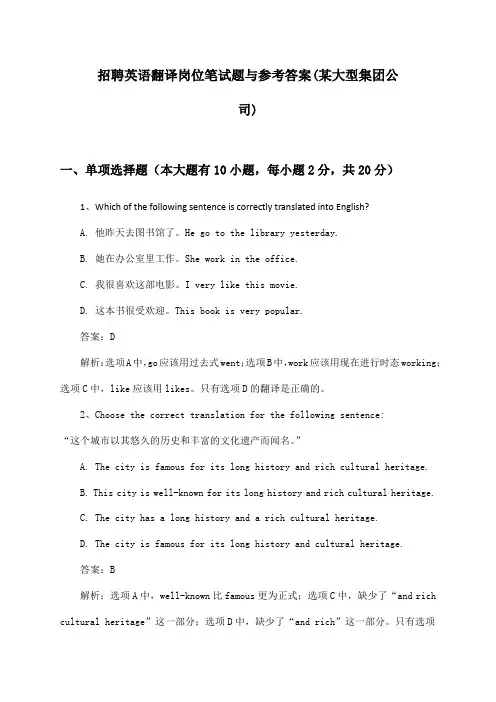
招聘英语翻译岗位笔试题与参考答案(某大型集团公司)一、单项选择题(本大题有10小题,每小题2分,共20分)1、Which of the following sentence is correctly translated into English?A. 他昨天去图书馆了。
He go to the library yesterday.B. 她在办公室里工作。
She work in the office.C. 我很喜欢这部电影。
I very like this movie.D. 这本书很受欢迎。
This book is very popular.答案:D解析:选项A中,go应该用过去式went;选项B中,work应该用现在进行时态working;选项C中,like应该用likes。
只有选项D的翻译是正确的。
2、Choose the correct translation for the following sentence:“这个城市以其悠久的历史和丰富的文化遗产而闻名。
”A. The city is famous for its long history and rich cultural heritage.B. This city is well-known for its long history and rich cultural heritage.C. The city has a long history and a rich cultural heritage.D. The city is famous for its long history and cultural heritage.答案:B解析:选项A中,well-known比famous更为正式;选项C中,缺少了“and rich cultural heritage”这一部分;选项D中,缺少了“and rich”这一部分。
只有选项B的翻译是完整且正确的。
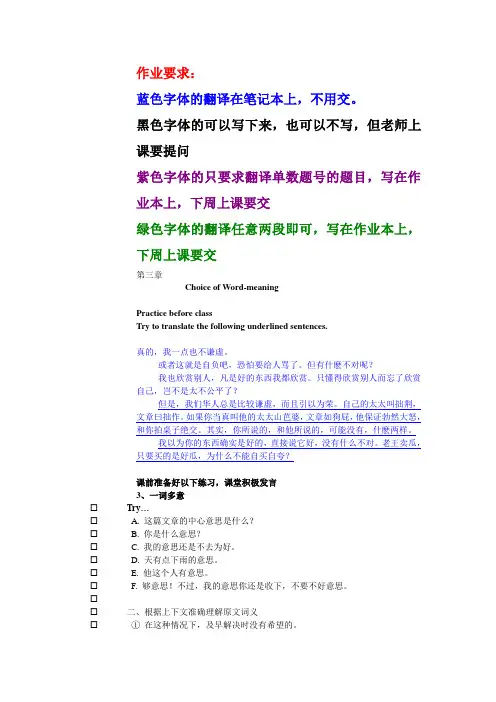
作业要求:蓝色字体的翻译在笔记本上,不用交。
黑色字体的可以写下来,也可以不写,但老师上课要提问紫色字体的只要求翻译单数题号的题目,写在作业本上,下周上课要交绿色字体的翻译任意两段即可,写在作业本上,下周上课要交第三章Choice of Word-meaningPractice before classTry to translate the following underlined sentences.真的,我一点也不谦虚。
或者这就是自负吧,恐怕要给人骂了。
但有什麽不对呢?我也欣赏别人,凡是好的东西我都欣赏。
只懂得欣赏别人而忘了欣赏自己,岂不是太不公平了?但是,我们华人总是比较谦虚,而且引以为荣。
自己的太太叫拙荆,文章曰拙作。
如果你当真叫他的太太山芭婆,文章如狗屁,他保证勃然大怒,和你拍桌子绝交。
其实,你所说的,和他所说的,可能没有,什麽两样。
我以为你的东西确实是好的,直接说它好,没有什么不对。
老王卖瓜,只要买的是好瓜,为什么不能自买自夸?课前准备好以下练习,课堂积极发言3、一词多意☐T ry…☐ A. 这篇文章的中心意思是什么?☐ B. 你是什么意思?☐ C. 我的意思还是不去为好。
☐ D. 天有点下雨的意思。
☐ E. 他这个人有意思。
☐F. 够意思!不过,我的意思你还是收下,不要不好意思。
☐☐二、根据上下文准确理解原文词义☐①在这种情况下,及早解决时没有希望的。
☐②今年不会大幅度地增加工资,几年来情况一直都是这样。
☐③医生说这种病在多数情况下会不治而愈。
☐④他的身体情况还不允许他现在出院。
☐⑤他发现该公司的经济情况陷入困境。
☐⑥情况怎么样?☐⑦这种情况必须改变。
☐⑧现在情况不同了。
☐⑨他问起了她的健康情况。
☐⑩我们要根据具体情况作出决定。
三、区别词语,正确选词又如…☐ 1.她性格宛如其母。
/她性格酷似其母。
☐ 2.她的性格像她妈妈。
/她的性格活像她妈妈。
☐ 3 她的性格随她娘。
/她的性格跟她娘一个样。
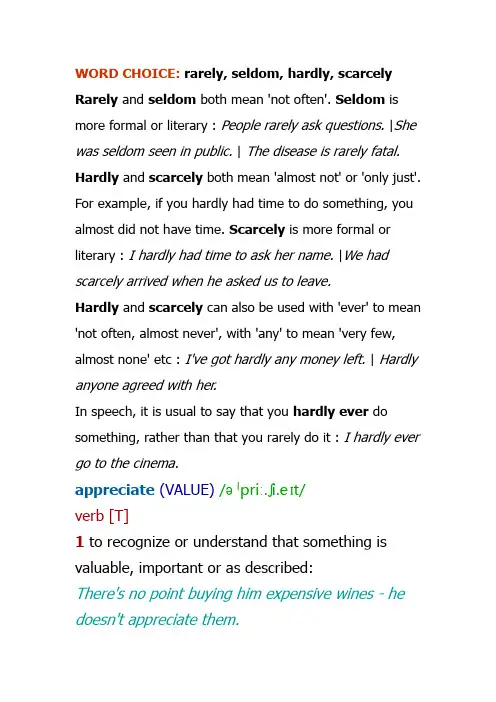
WORD CHOICE: rarely, seldom, hardly, scarcely Rarely and seldom both mean 'not often'. Seldom is more formal or literary : People rarely ask questions. |She was seldom seen in public. | The disease is rarely fatal. Hardly and scarcely both mean 'almost not' or 'only just'. For example, if you hardly had time to do something, you almost did not have time. Scarcely is more formal or literary : I hardly had time to ask her name. |We had scarcely arrived when he asked us to leave.Hardly and scarcely can also be used with 'ever' to mean 'not often, almost never', with 'any' to mean 'very few, almost none' etc : I've got hardly any money left. | Hardly anyone agreed with her.In speech, it is usual to say that you hardly ever do something, rather than that you rarely do it : I hardly ever go to the cinema.appreciate(VALUE)/əˈpriː.ʃi.eɪt/verb[T]1 to recognize or understand that something is valuable, important or as described:There's no point buying him expensive wines - he doesn't appreciate them.We appreciate the need for immediate action.[+ that] I appreciate that it's a difficult decision for you to make.[+ question word] I don't think you appreciate how much time I spent preparing this meal.2I/We appreciate... used when you are thanking someone or showing that you are grateful:We really appreciate all the help you gave us last weekend.[+ ing form of verb] I appreciate your mak ing the effort to come.3would appreciate used when you are politely requesting something:I would appreciate it if you could let me know (= Please let me know) in advance whether or not you will be coming.not be much of a sthto not be a good example of something or not be very good at somethingI'm not much of a dancer, I'm afraid.It wasn't really much of a storm.come about phr vto happen, especially in a way that is not plannedThe opportunity to get into computing came about quite by accident.I don't know how this confusion has come about.if a ship comes about, it changes directioncome across phr vcome across sb/sthto meet, find, or discover someone or something by chanceI came across an old diary in her desk.I've never come across anyone quite like her before.if an idea comes across well, it is easy for people to understandYour point really came across at the meeting.if someone comes across in a particular way, they seem to have particular qualities= come over come across asHe comes across as a very intelligent, sensitive man.She sometimes comes across as being rather arrogant.I don't think I came across very well (=seemed to have good qualities) in the interview.come across with [come across with sth] phr vto provide money or information when it is neededI hoped he might come across with a few facts.come after [come after sb] phr vto look for someone in order to hurt them, punish them, or get something from themShe was terrified that Trevor would come after her. come along phr vbe coming along informalto be developing or making progress= progressHe opened the oven door to see how the food was coming along.Your English is coming along really well.to appear or arriveA bus should come along any minute now.Take any job opportunity that comes along.a) to go to a place with someoneWe're going into town - do you want to come along? b) to go somewhere after someoneYou go on ahead - I'll come along later.come along!a) used to tell someone to hurry up= come onCome along! We're all waiting for you!b) used to encourage someone to try harder= come onCome along! Don't give up yet!come apart phr vto split or fall into piecesI picked the magazine up and it came apart in my hands. to begin to failThe whole basis of the agreement was coming apart.She felt as if her life was coming apart at the seams (=failing completely) .come around phr valso come round BrEto come to someone's home or the place where they work in order to visit them= come overI'll come around later and see how you are.Why don't you come round for lunch?also come round BrEto change your opinion so that you now agree with someone or are no longer angry with themcome around toIt took him a while to come around to the idea.Don't worry - she'll come round eventually.also come round BrEif a regular event comes around, it happens as usual By the time the summer came around, Kelly was feeling much better.AmE to become conscious again after you have been unconsciousBritish Equivalent: come roundWhen she came around her mother was sitting by her bed.come around fromYou might feel a little sick when you come around from the anesthetic.come at / [come at sb/sth] phr vto move towards someone in a threatening waySuddenly, he came at me with a knife.if images, questions, facts etc come at you, you feelconfused because there are too many of them at the same timeQuestions were coming at me from all directions. informal to consider or deal with a problem in a particular way= approachWe need to come at the problem from a different angle. come away phr vto become separated from the main part of something = come offOne of the wires in the plug had come away.I turned some of the pages and they came away in my hand.to leave a place with a particular feeling or ideaWe came away thinking that we had done quite well. come away withI came away with the impression that the school was very well run.come back phr vto return to a particular place or person= returnMy mother was scared that if I left home I'd never comeGinny's left me, and there's nothing I can do to persuade her to come back.to become fashionable or popular again→comebackWho'd have thought hippy gear would ever come back!High heels are coming back into fashion .to appear or start to affect someone or something again = returnThe pain in her shoulder was coming back again.It took a while for my confidence to come back.if something comes back to you, you remember it or remember how to do itAs I walked the city streets that evening, the memories came flooding back.come back toI can't think of her name at the moment, but it'll come back to me.to reply to someone quickly, often in an angry or unkind way→comeback come back atHe came back at me immediately, accusing me of beingcome before / [come before sb/sth] phr vto be brought to someone in authority, especially a judge in a law court, to be judged or discussed by themWhen you come before the judge, it's best to tell the whole truth.The case is due to come before the courts next month. come between [come between sb] phr vto make people argue and feel angry with each other, when they had been friends beforeNothing will ever come between us now.I didn't want to come between a husband and wife.to prevent someone from giving enough attention to somethingShe never let anything come between her and her work. come by phr vcome by sthto manage to get something that is rare or difficult to get How did you come by these pictures?Jobs were hard to come by .come by (sth)to make a short visit to a place on your way to somewhereHe said he'd come by later.I'll come by the house and get my stuff later, OK? come down phr va) if a price, level etc comes down, it gets lowerIt looks as if interest rates will come down again this month.b) to accept a lower pricecome down toHe's asking £5000, but he may be willing to come down to £4800.if someone comes down to a place, they travel south to the place where you areWhy don't you come down for the weekend sometime? come down toAre you coming down to Knoxville for Christmas?to fall to the groundA lot of trees came down in the storm.We were still out in the fields when the rain started coming down.come down on the side of sb/sth also come down in favour of sb/sthto decide to support someone or somethingThe committee came down in favour of making the information public.informal to start to feel normal again after you have been feeling very happy and excitedHe was on a real high all last week and he's only just come down.informal to stop feeling the effects of a strong drugWhen I came down, I remembered with horror some of the things I'd said.BrE old-fashioned to leave a university after completing a period of studycome down on [come down on sb] phr vto punish someone or criticize them severelyWe need to come down hard on young offenders.I made the mistake of answering back, and she came down on me like a ton of bricks (=very severely) . come down to / [come down to sb/sth] phr vif a complicated situation or problem comes down to something, that is the single most important thing It all comes down to money in the end.if something old has come down to you, it has beenpassed between people over a long period of time until you have itThe text which has come down to us is only a fragment of the original.come down with [come down with sth] phr vto get an illnessI think I'm coming down with a cold.come for / [come for sb/sth] phr vto arrive to collect someone or somethingI'll come for you at about eight o'clock.to arrive at a place in order to take someone away by forceMembers of the secret police came for him in the middle of the night.come forward phr vto offer help to someone, or offer to do something So far, only one candidate has come forward.The police are appealing for more witnesses to come forward with information.come from / [come from sb/sth] phr vif you come from a place, you were born there or lived there when you were youngI come from London originally.to be obtained from a place, thing, or person, or to start or be made somewhereA lot of drugs come from quite common plants.My information comes from a very reputable source.The idea came from America.to happen as the result of doing somethingcome from doing sthMost of her problems come from expecting too much of people.coming from him/her/you etcspoken used to say that someone should not criticize another person for doing something, because they have done the same thing themselvesYou think I'm too selfish? That's rich coming from you! where sb is coming from informalthe basic attitude or opinion someone has, which influences what they think, say, or doI can see where you're coming from now.come in phr vif a train, bus, plane, or ship comes in, it arrives at a place What time does your train come in?come in toWe come in to Heathrow at nine in the morning.if money or information comes in, you receive itReports are coming in of a massive earthquake in Mexico.We haven't got enough money coming in.to be involved in a plan, deal etcWe need some financial advice - that's where Kate comes in.come in onYou had the chance to come in on the deal.to join in a conversation or discussionCan I come in here and add something to what you're saying?to become fashionable or popular≠ go outTrainers really became popular in the 1980s, when casual sportswear came in.to finish a racecome in first/second etcHis horse came in second to last.if the tide comes in, the sea moves towards the land andcovers the edge of it≠ go outcome in for [come in for sth] phr vcome in for criticism/blame/scrutinyto be criticized, blamed etc for somethingThe government has come in for fierce criticism over its handling of this affair.come into [come into sth] phr vto receive money, land, or property from someone after they have diedShe'll come into quite a lot of money when her father dies.to be involved in somethingJosie doesn't come into the movie until quite near the end.Where do I come into all this?come into view/sightif something comes into view, you begin to see it The mountains were just coming into view.come into leaf/flower/blossomto start to produce leaves or flowersThe early roses were just coming into flower.not come into itspoken used to say that something is not important Money doesn't really come into it.come into your ownto become very good, useful, or important in a particular situationOn icy roads, a four-wheel drive vehicle really comes into its own.come of [come of sth] phr vto happen as a result of somethingI did ask a few questions, but nothing came of it.That's what comes of not practising - you've forgotten everything!come off phr vcome off (sth)to become removed from somethingThe label had come off, so there was no way of knowing what was on the disk.come off (sth)BrE to fall off somethingDyson came off his bike as he rounded the last corner, but wasn't badly hurt.informal if something that has been planned comes off, it happensIn the end the trip never came off.informal to be successfulIt was a good idea, but it didn't quite come off.The performance on the first night came off pretty well .come off sthto stop taking a drug that you have been taking regularly It wasn't until I tried to come off the pills that I realized I was addicted.come off best/better/worst etcBrE to gain or lose the most, more, the least etc from a situationAs far as pensions go, it's still women who come off worst.come off it!BrE spoken used to tell someone that you do not believe what they are sayingOh come off it! You can't seriously be saying you knew nothing about any of this.come on phr vcome on!spoken a) used to tell someone to hurryCome on, we'll be late!b) used to encourage someone to do somethingCome on, you can do it!Come on, cheer up!c) used to tell someone that you know that what they have just said was not true or rightOh come on, don't lie!d) used to make someone angry enough to want to fight youCome on, then, hit me!come on in/over/up etcspoken used to tell someone to come in, over, up etc, usually in a friendly wayCome on in - I've made some coffee.if a light or machine comes on, it starts workingA dog started barking and lights came on in the house. if an illness comes on, you start to be ill with itI can feel a headache coming on.if a television or radio programme comes on, it startsJust at that moment, the news came on.if rain or snow comes on, it startsThe rain came on just before lunchtime.to come onto a stage or sports fieldHe scored only two minutes after he'd come on.to improve or make progressThe children are really coming on now.Your English is coming on really well.come on sb/sthto find or discover someone or something by chance We came on a group of students having a picnic. come on strong informalto make it very clear to someone that you think they are sexually attractivecome on to / [come on to sb/sth] phr vto start talking about a new subjectI'll come on to this question in a few moments. informal if someone comes on to another person, they make it very clear that they are sexually interested in them →come-onThe way she was coming on to Jack, I'm amazed he managed to get out alive!come out phr vif something comes out, it is removed from a placeThese stains will never come out!if information comes out, people learn about it, especially after it has been kept secretNo doubt the truth will come out one day.It's come out that several ministers received payments from the company.if a photograph comes out, it shows a clear pictureI took loads of photographs, but most of them didn't come out.Some of the wedding photos have come out really well. if a book, record etc comes out, it becomes publicly availableWhen is the new edition coming out?if something comes out in a particular way, that is what it is like after it has been made or producedI've made a cake, but it hasn't come out very well.The cover has come out a bit too big.if something you say comes out in a particular way, that is how it sounds or how it is understoodHis words came out as little more than a whisper.That didn't come out the way I meant it to.I tried to explain everything to her, but it came out all wrong (=not in the way I intended) .if someone comes out in a particular way, that is the situation they are in at the end of an event or series of eventsThe more experienced team came out on top.come out ofShe came out of the divorce quite well.to be easy to noticeHis right-wing opinions come out quite strongly in his later writings.to say publicly that you strongly support or oppose a plan, belief etccome out in favour ofThe board of directors has come out strongly in favour of a merger.come out againstTeachers have come out against the proposed changes.At least he's got the courage to come out and say what he thinks.if the sun, moon, or stars come out, they appear in the skyThe sky cleared and the sun came out.if a flower comes out, it opensThe snowdrops were just starting to come out.if someone comes out, they say that they are gay when this was a secret beforecome out toThat summer, I decided to come out to my parents. BrE informal to refuse to work, as a protestNurses have threatened to come out in support of their pay claim.We decided to come out on strike .if a young woman came out in the past, she was formally introduced into upper class society at a large formal dance come out at [come out at sth] phr vif something comes out at a particular amount, that is the amount it adds up toThe whole trip, including fares, comes out at $900. come out in [come out in sth] phr vcome out in spots/a rash etcif you come out in spots etc, spots appear on your body If I eat eggs, I come out in a rash.come out of [come out of sth] phr vto no longer be in a bad situationThere are signs that the country is coming out of recession.to happen as a result of somethingOne or two excellent ideas came out of the meeting. come out of yourself informalto start to behave in a more confident wayPenny's really come out of herself since she started that course.come out with [come out with sth] phr vto say something, especially something unusual or unexpectedSome of the things he comes out with are so funny! come over phr va) if someone comes over, they visit you at your houseDo you want to come over on Friday evening?b) if someone comes over, they come to the country where you arecome over to/fromWhen did your family first come over to America? come over sbif a strong feeling comes over you, you suddenly experienceitA wave of sleepiness came over me.I'm sorry about that - I don't know what came over me (=I do not know why I behaved in that way) .if an idea comes over well, people can understand it easilyI thought that the points he was making came over quite clearly.if someone comes over in a particular way, they seem to have particular qualities= come acrossHe didn't come over very well (=seem to have good qualities) in the interview.come over asShe comes over as a very efficient businesswoman. come over (all) shy/nervous etc informalto suddenly become very shy, nervous etccome round phr vto come aroundcome through phr vif a piece of information, news etc comes through, it arrives somewhereWe're still waiting for our exam results to come through.There is news just coming through of an explosion in a chemical factory.to be made official, especially by having the correct documents officially approvedI'm still waiting for my divorce to come through.come through (sth)to continue to live, be strong, or succeed after a difficult or dangerous timeIf he comes through the operation OK he should be back to normal within a few weeks.It's been a tough time, but I'm sure you'll come through and be all the wiser for it.come through with [come through with sth] phr vto give someone something they need, especially when they have been worried that you would not produce it in timeOur representative in Hong Kong finally came through with the figures.come to phr vcome to a decision/conclusion/agreement etcto decide something, agree on something etc afterconsidering or discussing a situation= reachWe came to the conclusion that there was no other way back to the camp.If they don't come to a decision by midnight, the talks will be abandoned.come to a halt/stopa) to slow down and stop= stopThe train came to a stop just yards from the barrier. b) to stop operating or continuingAfter the election our funding came to an abrupt halt. come to sthto develop so that a particular situation exists, usually a bad oneI never thought it would come to this .We need to be prepared to fight, but hopefully it won't come to that (=that won't be necessary) .All those years of studying, and in the end it all came to nothing .It's come to something when I'm not allowed to express an opinion in my own house!what is the world/the country etc coming to?(=used to say that the world etc is in a bad situation) come to sthto add up to a total amountThat comes to £23.50.The bill came to £48.50.come to sbif a thought or idea comes to you, you realize or remember somethingThe answer came to me in a flash.I've forgotten her name, but maybe it'll come to me later. to become conscious again after you have been unconsciousWhen he came to, he was lying on the floor with his hands tied behind his back.when it comes to sth informalwhen you are dealing with something or talking about somethingHe's a bit of an expert when it comes to computers. come under [come under sth] phr vcome under attack/fire/scrutiny etcto be attacked, shot at etcThe government has come under attack from opposition leaders over proposals to cut health spending.to be governed or controlled by a particular organization or personThe organization comes under the authority of the EU. if a piece of information comes under a particular title, you can find it under that titleThe proposals come under three main headings. come up phr vif someone comes up to you, they come close to you, especially in order to speak to youOne of the teachers came up and started talking to me. come up toA man came up to him and asked for a light.if someone comes up to a place, they travel north to the place where you arecome up toWhy don't you come up to New York for the weekend? if a subject comes up, people mention it and discuss it = ariseHis name came up in the conversation.The subject of salaries didn't come up.if a problem or difficulty comes up, it appears or starts to affect you= ariseI'm afraid I'll have to cancel our date - something's come up .The same problems come up every time.if a job or an opportunity comes up, it becomes availableA vacancy has come up in the accounts department.to be dealt with in a law courtYour case comes up next week.be coming upto be going to happen soonWith Christmas coming up, few people have much money to spare.if the sun or moon comes up, it moves up into the sky where you can see it= riseIt was six o'clock, and the sun was just coming up.if a plant comes up, it begins to appear above the ground The first spring bulbs are just coming up.if food comes up, it goes back through your mouth from your stomach after being swallowedcoming (right) up!spoken used to say that food or drink will be ready very soon'Two martinis, please.' 'Coming up!'come up against / [come up against sth/sb] phr vto have to deal with problems or difficultiesWe may find we come up against quite a lot of opposition from local people.You've got no idea of what you're going to come up against.come up for [come up for sth] phr vcome up for discussion/examination/review etcto be discussed, examined etcThis matter will come up for discussion at next month's meeting.The regulations come up for review in April.come up for election/re-election/selection etcto reach the time when people have to vote about whether you should continue in a political positionThe governors come up for re-election next year. come upon / [come upon sb/sth] phr vto find or discover something or someone by chanceWe came upon a little cottage just on the edge of the wood.literary if a feeling comes upon you, you suddenly feel itA wave of tiredness came upon her.come up to / [come up to sth/sb] phr vto reach a particular standard or to be as good as you expectedThis doesn't come up to the standard of your usual work.The resort certainly failed to come up to expectations .be (just) coming up to sthto be nearly a particular timeIt's just coming up to 11 o'clock.come up with [come up with sth] phr vto think of an idea, answer etcIs that the best excuse you can come up with?We've been asked to come up with some new ideas. informal to produce an amount of moneyWe wanted to buy the house but we couldn't come up with the cash.How am I supposed to come up with $10,000?boring activity[sing.] (informal) an activity that is tiring or boring and takes a lot of time: the daily grind of family life ◆It's a long grind to the top of that particular profession.of machinessynonymsmean activity involving effort or exertion. WORK may imply activity of body, of mind, of a machine, or of a natural force <too tired to do any work>.physical or intellectual work involving great and often strenuous exertion <farmers demanding fair compensation for their labor>.or suffering <years of travail were lost when the houselot would be years of back-breaking toil>.suggests dull and irksome labor <an editorial job with a good deal of drudgery>. implies labor exhausting to mind or body <the grind of the assembly line>. synonyms WORK, EMPLOYMENT, OCCUPATION, CALLING, PURSUIT, MÉTIER, BUSINESS mean a specific sustained activity engaged in especially in earning one's living. WORK may apply to any purposeful activity whether remunerativeor not <her work as a hospital volunteer>. EMPLOYMENT implies work for which one has been engaged and is being paid by an employer <your employment with this firm is hereby terminated>. OCCUPATION implies work in which one engages regularly especially as a result of training <his occupation as a trained auto mechanic>. CALLING applies to an occupation viewed as a vocation or profession <the ministry seemed my true calling>. PURSUIT suggests a trade, profession, or avocation followed with zeal or steady interest <her family considered medicine the only proper pursuit>. BUSINESS suggests activity in commerce or the management of money and affairs <the business of managing a hotel>.pick at[PHRASAL VERB] V P nIf you pick at the food that you are eating, you eat only very small amounts of it.Sarah picked at a plate of cheese for supper, but she wasn't really hungry.pick off[PHRASAL VERB] V P n (not pron), V n P。
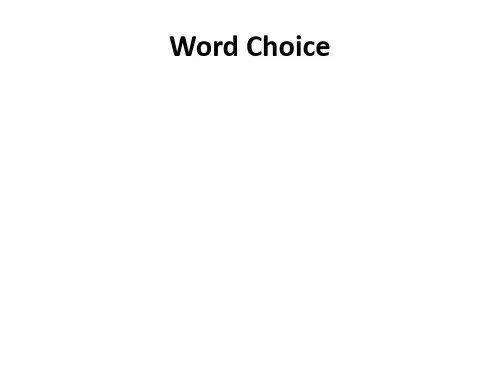

word怎么筛选内容Word怎么筛选内容。
在使用Word处理文档时,我们经常需要对文档中的内容进行筛选,以便更好地编辑和管理文档。
Word提供了丰富的筛选功能,能够帮助我们快速准确地找到需要的内容。
下面将介绍一些常用的筛选方法,希望能帮助大家更好地利用Word进行文档处理。
一、使用查找功能筛选内容。
在Word中,我们可以使用查找功能来筛选文档中的内容。
点击Word菜单栏中的“编辑”选项,选择“查找”,在弹出的查找对话框中输入要查找的内容,点击“查找下一个”按钮,Word会自动定位到文档中符合条件的内容,方便我们进行编辑和处理。
二、使用筛选功能筛选表格内容。
如果我们需要在Word文档中的表格中筛选内容,可以使用表格筛选功能。
首先选中需要筛选的表格,然后点击表格工具栏中的“筛选”按钮,Word会在表格的标题栏中添加筛选按钮,点击这些按钮可以对表格中的内容进行筛选,非常方便快捷。
三、使用通配符进行高级筛选。
在Word中,我们还可以使用通配符进行高级筛选。
通配符是一种特殊的符号,可以代替一个或多个字符,帮助我们更精确地筛选内容。
例如,我们可以使用“”代表任意字符,使用“?”代表单个字符,利用这些通配符可以快速准确地找到需要的内容。
四、使用筛选工具栏进行条件筛选。
Word还提供了筛选工具栏,可以帮助我们进行条件筛选。
在Word菜单栏中选择“数据”选项,点击“筛选”,Word会在表格中添加筛选工具栏,我们可以根据需要设置筛选条件,Word会自动筛选出符合条件的内容,非常方便实用。
五、使用快速筛选功能进行内容筛选。
除了上述方法,Word还提供了快速筛选功能,可以帮助我们快速准确地筛选内容。
在Word文档中选中需要筛选的内容,然后点击“数据”选项中的“快速筛选”按钮,Word会自动对选中的内容进行筛选,非常方便快捷。
六、使用自定义筛选进行内容筛选。
最后,我们还可以使用自定义筛选功能进行内容筛选。
在Word 中选择“数据”选项,点击“自定义筛选”,可以根据需要设置筛选条件,Word会根据条件筛选出符合要求的内容,帮助我们更好地管理文档。
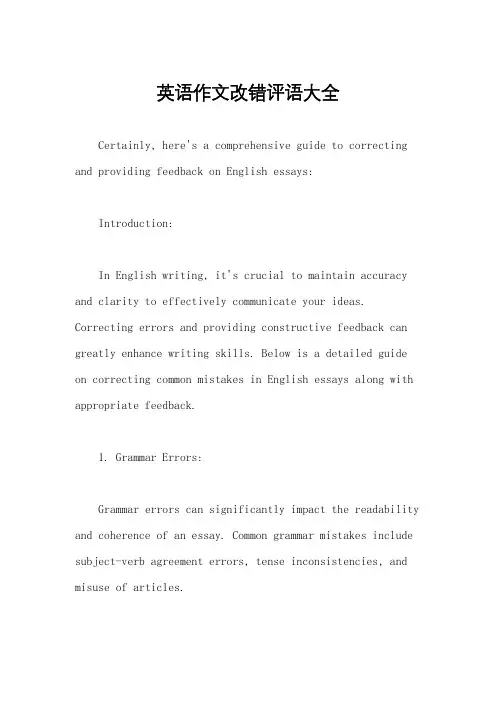
英语作文改错评语大全Certainly, here's a comprehensive guide to correcting and providing feedback on English essays:Introduction:In English writing, it's crucial to maintain accuracy and clarity to effectively communicate your ideas. Correcting errors and providing constructive feedback can greatly enhance writing skills. Below is a detailed guide on correcting common mistakes in English essays along with appropriate feedback.1. Grammar Errors:Grammar errors can significantly impact the readability and coherence of an essay. Common grammar mistakes include subject-verb agreement errors, tense inconsistencies, and misuse of articles.Correction: 。
For example, if the sentence reads: "He don't like to go to school."Feedback:Correct the subject-verb agreement: "He doesn't like to go to school."Use the appropriate verb form to match the subject.2. Punctuation Errors:Punctuation errors can alter the meaning of sentences and affect the flow of writing. Common punctuation mistakes include missing commas, improper use of apostrophes, and overuse of exclamation marks.Correction: 。
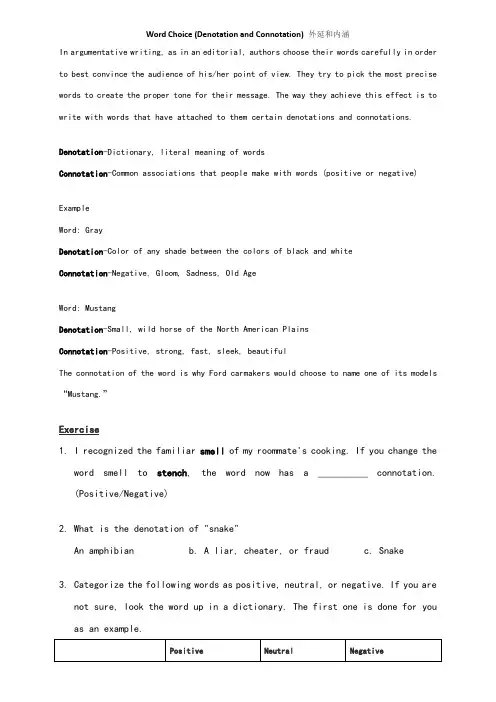
Word Choice (Denotation and Connotation) 外延和内涵In argumentative writing, as in an editorial, authors choose their words carefully in order to best convince the audience of his/her point of view. They try to pick the most precise words to create the proper tone for their message. The way they achieve this effect is to write with words that have attached to them certain denotations and connotations.Denotation-Dictionary, literal meaning of wordsConnotation-Common associations that people make with words (positive or negative)ExampleWord: GrayDenotation-Color of any shade between the colors of black and whiteConnotation-Negative, Gloom, Sadness, Old AgeWord: MustangDenotation-Small, wild horse of the North American PlainsConnotation-Positive, strong, fast, sleek, beautifulThe connotation of the word is why Ford carmakers would choose to name one of its models “Mustang.”Exercise1.I recognized the familiar smell of my roommate's cooking. If you change theword smell to stench, the word now has a __________ connotation.(Positive/Negative)2.What is the denotation of "snake"An amphibian b. A liar, cheater, or fraud c. Snake4.Read each of the following sentences. Decide from the context whether thespeaker is showing approval or disapproval of the topic. Circle the best word.1. “The sooner we move out of this (home, dump),” said Jack, “the happier I’ll be.”2. This cell phone is (expensive, overpriced), but I don’t mind paying extra because it has so many useful features.3. You’re lucky to have Wilma on your committee. She has lots of (original, crazy) ideas.4. Boss Reed and his (cronies, employees) have controlled the politics in this city for more than twenty years. I certainly hope the other party wins this year!5. It was a beautiful spring day, and the (stench, scent) of apple blossoms filled the whole yard.6. I hope I don’t have to share an office with Janice. Sandra told me how (curious, nosy) she can be.7. “I think Fay is an excellent president,” said the principal. “She really knows how to (manage, meddle).”。

Word一次性选择英文或数字, 正选与反选所有中文用查找与替换对于混有英文、中文和数字的文档来说,有时需要把英文单独选择出来,有时又需要把中文或数字单独选择出来,总之,实际需求总是千变万化。
无论要求选择哪一种,不可能用鼠标一个个去选择,如果那样工作量将不可想象,应该怎么来选择呢?能达到这种要求的也只能用查找和替换,当然用宏也可以,但普通用户都不懂编写宏程序,下面将分享用查找和替换一次性选择英文或数字,一次正选和反选所有中文的方以及一次性选中全部英文和数字的方法。
一、Word一次性选择英文(一)方法一:用“任意字母”查找1、用Word 打开要一次性选择英文的文档,我们以Word 2016 为例,然后选择“开始”选项卡,单击右上角的“查找”右边的小三角,选择“高级查找”,如图1所示:请点2、打开“查找和替换”窗口,并自动选择“查找”选项卡,如图2所示:请点击提示:或者按Ctrl + H 打开“查找和替换”窗口,然后按 D 选择“查找”选项卡。
Word 旧一些的版本,可以按Ctrl + F 打开查找窗口。
3、单击“更多”展开,再单击“特殊格式”,在展开的选项中选择“任意字母”,如图3所示:请点4、“任意字母”表示符自动填到“查找内容”右边的输入框中,如图4所示:请提示:也可以直接在“查找内容”右边的输入框中输入^$;^ 表示任意,$ 表示字母。
5、“搜索选项”除勾选“区分全/半角”外,其他的都不要勾选择,单击“在以下项中查找”,选择“主文档”,如图5所示:6、则Word 开始查找,所需时间长短与文档内容有关,内容越多,所需时间越长;内容越少,所需时间越短。
当前打开的文档,内容不多,因此,一下就选中了文档中所有英文,如图6所示:(二)方法二:用英文字母范围查找1、同样方法打开“查找和替换”窗口,在“查找内容”右边输入[a-zA-Z],如图7所示:提示:如果嫌输入麻烦或避免出错,也可以直接把[a-zA-Z] 复制到“查找内容”输入框。
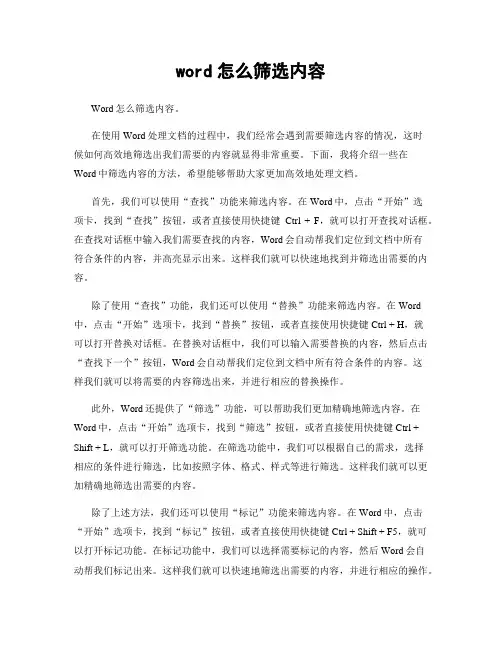
word怎么筛选内容Word怎么筛选内容。
在使用Word处理文档的过程中,我们经常会遇到需要筛选内容的情况,这时候如何高效地筛选出我们需要的内容就显得非常重要。
下面,我将介绍一些在Word中筛选内容的方法,希望能够帮助大家更加高效地处理文档。
首先,我们可以使用“查找”功能来筛选内容。
在Word中,点击“开始”选项卡,找到“查找”按钮,或者直接使用快捷键Ctrl + F,就可以打开查找对话框。
在查找对话框中输入我们需要查找的内容,Word会自动帮我们定位到文档中所有符合条件的内容,并高亮显示出来。
这样我们就可以快速地找到并筛选出需要的内容。
除了使用“查找”功能,我们还可以使用“替换”功能来筛选内容。
在Word 中,点击“开始”选项卡,找到“替换”按钮,或者直接使用快捷键Ctrl + H,就可以打开替换对话框。
在替换对话框中,我们可以输入需要替换的内容,然后点击“查找下一个”按钮,Word会自动帮我们定位到文档中所有符合条件的内容。
这样我们就可以将需要的内容筛选出来,并进行相应的替换操作。
此外,Word还提供了“筛选”功能,可以帮助我们更加精确地筛选内容。
在Word中,点击“开始”选项卡,找到“筛选”按钮,或者直接使用快捷键Ctrl + Shift + L,就可以打开筛选功能。
在筛选功能中,我们可以根据自己的需求,选择相应的条件进行筛选,比如按照字体、格式、样式等进行筛选。
这样我们就可以更加精确地筛选出需要的内容。
除了上述方法,我们还可以使用“标记”功能来筛选内容。
在Word中,点击“开始”选项卡,找到“标记”按钮,或者直接使用快捷键Ctrl + Shift + F5,就可以打开标记功能。
在标记功能中,我们可以选择需要标记的内容,然后Word会自动帮我们标记出来。
这样我们就可以快速地筛选出需要的内容,并进行相应的操作。
总的来说,Word提供了多种方法来帮助我们筛选内容,我们可以根据自己的需求选择合适的方法进行操作。
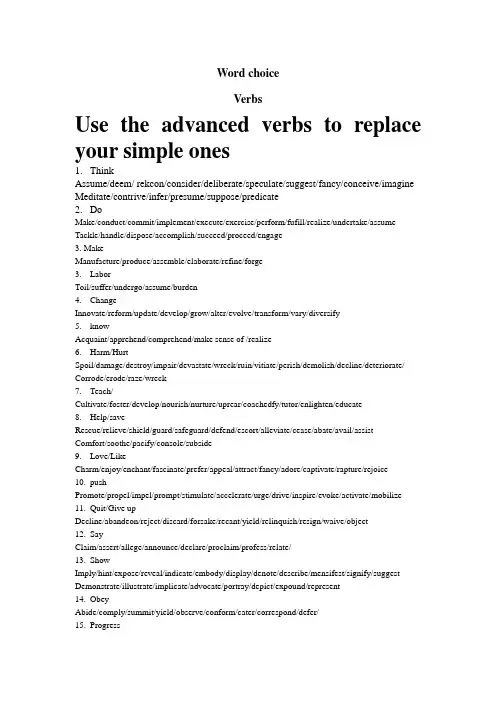
Word choiceVerbsUse the advanced verbs to replace your simple ones1.ThinkAssume/deem/ rekcon/consider/deliberate/speculate/suggest/fancy/conceive/imagine Meditate/contrive/infer/presume/suppose/predicate2.DoMake/conduct/commit/implement/execute/exercise/perform/fufill/realize/undertake/assume Tackle/handle/dispose/accomplish/succeed/proceed/engage3. MakeManufacture/produce/assemble/elaborate/refine/forgeborToil/suffer/undergo/assume/burden4.ChangeInnovate/reform/update/develop/grow/alter/evolve/transform/vary/diversify5.knowAcquaint/apprehend/comprehend/make sense of /realize6.Harm/HurtSpoil/damage/destroy/impair/devastate/wreck/ruin/vitiate/perish/demolish/decline/deteriorate/ Corrode/erode/raze/wreck7.Teach/Cultivate/foster/develop/nourish/nurture/uprear/coachedfy/tutor/enlighten/educate8.Help/saveRescue/relieve/shield/guard/safeguard/defend/escort/alleviate/cease/abate/avail/assistComfort/soothe/pacify/console/subside9.Love/LikeCharm/enjoy/enchant/fascinate/prefer/appeal/attract/fancy/adore/captivate/rapture/rejoice10.pushPromote/propel/impel/prompt/stimulate/accelerate/urge/drive/inspire/evoke/activate/mobilize11.Quit/Give upDecline/abandeon/reject/discard/forsake/recant/yield/relinquish/resign/waive/object12.SayClaim/assert/allege/announce/declare/proclaim/profess/relate/13.ShowImply/hint/expose/reveal/indicate/embody/display/denote/describe/mensifest/signify/suggest Demonstrate/illustrate/implicate/advocate/portray/depict/expound/represent14.ObeyAbide/comply/summit/yield/observe/conform/cater/correspond/defer/15.ProgressFlourish/abound/teem/boom/thrive/advance/stride16.TroubleBother/plague/harass/frown/irritate/provoke/frustrate/dismay/afflict/agonize/annoy/embarrass Vex/hassle/ torment17.Want/HopeLong/ desire/ expect/hunger/ thirst /crave/yearn/pine/hanker18.Urge/pressStimulate/ rouse/arouse/awaken/enlignten/inspire/motivate/spur/ignite/actuate/activiate/provoke 19.focus/pay attention toCenter on/pinpoint/concentrate/spotlight/fix20.attractAppeal/enchant/charm/fascinate/ captivate/enthrall/bewitch21.speed upAccelerate/ quicken/ spur/gallop/expedite/facilitate/eEmploy/ engage/apply/exploit/utilize/make use of/avail oneself of/ take advantage of/trade on 23.shockHorrify/terrify/appall/frighten/ dismay/scare/24.decideDetermine/ settle/ choose/opt/commit oneself to/resolvepeteRival/emulate/match/contend/vie26.Stand/ BearPut up with/withstand/tolerate/endure/weather27.puzzleConfuse/bewilder/perplex/confound/disorient/baffle/mystify28.FreeLiberate/release/loose/deliver/unbind/unshackle/emancipate/manumit29.Mix/Blend/combine/compound/mingle/meld/merge/30. Call offCancel/abort/revoke/abolish/repeal/abate/terminate/dissolve31. Bear/Put up withStand/tolerate/endure/withstand/weather32. EnableEmpower/invest/endow/entitle/authorize/capacitate/reinforce33. AdaptAdjust/accommodate/orient/acclimate/habituate/gear34. Bring upDevelop/feed/cultivate/educate/nourish/forster/maintain/sustain/breed/edify35. PollutePoison/blemish/blot/contaminate/stain36. AppearEmerge/arise/surface/37. DisappearVanish/evaporate/disperse/fade away38. ValueCherish/treasure/prize/appreciate/hold dear39. StopPrevent/prohibit/discourage/block/retard/hamper/deter/obstruck/arrest/baffle/obstruct40. PromisePledge/assure/ensure/guarantee/warrant/commit41. outdo/overrunExceed/surpass/transcend/surmount/excel42. Join / take part inPlunge into/participate in/engage in/be occupied with/be involved in/apply oneself to/NounsAbortion Absence Access Acquisition Accordance Accuracy Attempt Aptitude Arrival Advent Adversity Agony Appeal Approval Assumption Assurance Assistance Ambition Adventure Application Approach Adour Aspiration Anticipation Awareness AddictionAweBarrierBiasBoomBreakdownChallengeCharmConcernContemptConventionConvenienceConsciousnessConsequenceCuriosityCharityCompromiseComplaintCompetitionContributionConflictConsumptionCommitmentCollapseCorruptionConceptionConsiderationConscienceConquestConcentrationClimax/zenithDisciplineDeclineDepartureDedicationDignityDilemmaDeceitDeterminationDespairDepressionDamageDelightDismayEndeavorEmphasisEmbryoEmergencyEmbarrassmentEnduranceEnlightenment Encouragement Evolution Enthusiasm Entertainment Essence Exhaustion Expense Expenditure Ecstasy Exposure Exploitation Fatigue Faculty Feedback Fascination Flourish Frustration Guidance Gratitude Guarantee Hospitality Humanity Humility Hostility Hazard Harmony Ignorance Illiteracy Illusion Impulse Impetus Innovation Insight Initiative Influence Inspiration Impact Impulsion Integrity Indignity Intellect Intension Intelligence InfancyInnocenceIsolationJealousyJusticeKnackKernelLanguorLackLeadershipLegendLiabilityLikelihoodLimitation/limitLustLuxuryLayoutLiteracyMaximum/minimumMaterialismMilestoneMiseryModernizationMoralityMotiveMiracleMaintenanceMisfortuneMischiefMultitudeMoanMaliceManiaMarvelMeasureMiniatureMirageMythMysteryNightmareNecessityNoveltyObedienceObligationOriginalityObsessionOccupationOccurrenceOpportunityOptionPossibilityPatriotismPersistencePopularityPossessionPovertyPreparationPreferencePrejudicePremisePrivilegePrestigeProspectPropertyProtestPriorityProficiencyPurposePursuitRecessionRealmResponseReliefRitualResolutionResistanceRomanceRenaissance/revivalRealizationRevengeRenownRelianceSacrificeSecrecySchemeSecurityScrutinySpectacleSimilarityShortageSignificanceStrategySuperioritySymposiumTackTacticsTendencyTemptationThresholdThriftyTriumphUrgencyVitalityVarietyViolenceVigourWelfareWarrantYieldZeal/ZestAdjectiveAuthenticAncientAbundantAppropriateAvailable/accessible Amazing/astonishing BeneficialFeasibleModerateProminentRenownedAlmightyGeniusVersatileAgileBriskVigorousEnergeticDynamicIgnorant ExhaustedWearyFeebleDelicateSubtleVulgarTransparentFertileExuberantOrthodoxSevere/sternInevitable/unavoidableIndispensableSpecific/concreteBizarre/queerCuriousFantasticMarvelous/awesomeRomanticComplex/complicatedIntricateConvincing/persuasiveMysteriousPotentialCapableObscureVagueFortunateFuriousSheerRigid/stiffPermanentEternalConstantContinuous/continualFlexibleFragileCrispTangibleExoticMassiveTransientTemporaryNeighboringInherent/inbornSuperiorInferiorSupremeProfoundSuperficialSubordinateEnormousGiantInfiniteMultipleNumerousFrequentRegularVariousDiversifiedAmpleSufficientEffectiveEfficientDevoidInadequateChaosFutileSterileBarrenBleakIsolatedAloofSolitaryArduousStudiousDiligentIndustriousThorny/troublesomeVainPrevailing/PrevalentVogueFashionablePreviousPriorFormalPromisingPrimaryOriginalInitialSubsequentCrucial/critical UrgentAbruptMasculine FeminineDomesticSecularRoyalIllegalRural/urbane Invincible IrresistibleIronicIncredibleDevoted/dedicated PiousPastoral Appetizing Appealing/fascinating Charming/pleasing DisgustedAddictedBrilliantRadiantSplendid Magnificent MajesticGloomy Depressed FrustratedRelevantSimilarFamiliar Extravagant/luxurious Lavish Enthusiastic/zealous Placid/serene TranquilPrecise/accurateConciseSuccinctAnnoyingPuzzlingConfusedPerplexedOverwhelmingDominatePrincipalEnduring/lastingDelicate/frailFierce/violentSavageDistinguishedCelebratedEminentNotoriousPrecious/valuedProlific/productiveHesitant/reluctantApparent/manifestPartial/biased/prejudicedInfluential/infectiousConsiderate/thoughtfulProhibited/forbiddenQualified/competentProsperousThriving/flourishingTedious/fatiguingComfortable/soothingEnduring/tolerantDisastrousEquivalentEnsuingEloquentEnterprisingEnjoyableEthicEthnicUnprecedentedAppalling/hideousCautious/prudent/waryDecisiveHeroicPatrioticTremendousEconomical/economicPanoramicParallel。

Word Choice1.F ormal vs. Informal正式/非正式语言学家Joos曾根据正式程度(level of formality)将语言分为五个级别:刻板体frozen,正式体formal,询议体consultative,随便体casual ,亲密体intimate。
例:刻:Visitor would make their way at once to the upper floor by way of the staircase.正:Visitors should go up to the stairs at once.询:Would you mind going upstairs right away, please?随:Time you all went upstairs now.亲:Up you go, chaps!刻板体用于专业书面语或庄严的演讲。
正式体一般用于书面语或公众演讲,它的主要目的是传播信息。
询议体属于中间性的标准语体,它用语比较准确,发音清楚,句法相当完整,语意表达充分,是其他各种语体的基础。
随便体用于熟人、朋友和“知情者”,其特点是:一省略句法,二使用俚语。
亲密体用于最熟悉的人之间,其特点高度删节,使用行话jargon. 语体的正式程度与交际方式有密切的联系。
Written English tends to be formal.Spoken English tends to be informal.举例:1.You’re extremely talkative. (formal)You talk a lot. (informal)You’re an old wind bag. (slang)2.At what time shall we dine?(formal)When do we eat?(informal)When do we put on the feedbag?(slang)3. A rich woman was killed last night.(formal)Someone killed a rich woman last night.(colloquial)4. Through the window, came in the sweet song.(formal) The sweet song came in through the window.(colloquial)5. The college requires all the students to submit their essay by a given time.(fl)I’ve got to hand in this essay by tomorrow.(colloquial)Formal informal colloquial Gentleman man guy, chap Impoverished poorWealthy richIntelligent smart bright Automobile carTelevision TVPornography sexTolerate stand/bear put up with Entertainment play/games fun Pleasure fun funLovely lovely cute2. Laudatory (commendatory )words vs. derogatory words褒贬义Examples:They live in a small town.I can never forget the little town where I spent my happy childhood.Commendatory words Derogatory words Statesman politicianLittle smallModest humbleBe interested in be addicted toBe absorbed in indulge oneself inBe engaged inBe keen onInfluence affectassertive aggressiveplump fatslender thinfamous notoriousYour niece impressed me as sweet and _____.(childlike/childish)Is that ______ (elderly/old) gentleman sitting on the bench your father?You must be _____ and do what you think best. (resolute/ stubborn)Keys: childlike, elderly, resolute3.E xactness of words’ meaning 准确A judge must be _____ in the case he tries. (disinterested/uninterested)The president spoke on radio to the ______ .( nation/land) On this ______ spot, a battle was fought which changed the history of the world. (historic/historical)People are serious and ______ at religious services.(respectful/respectable)She _____ to have lunch with her friend, saying that shewasn’t feeling well.(declined/refused)Keys: disinterested, nation, historic, respectful, declined4.V ividness生动General meaning vs. Specific meaninga.The wind was blowing in my face.b.The gentle breeze was caressing my cheeks tenderly.a.The clouds were passing overhead.b.The fleecy clouds were sailing leisurely along the azure(天蓝色的)sky.a.Some children stood anxiously at the counter.b.Four little urchins in ragged blue jeans stood with theirsmudgy faces pressed against the candy counter.a.It is very cold.b.The biting cold pierced through my bones.Laugh, smile, grin露齿而笑, beam 微笑, giggle偷偷笑, titter吃吃地笑, chuckle轻声地笑, guffaw捧腹地笑,chortle咯咯地笑Exercise:Try to fill in the blanks below with more specific words by choosing from the list of words given:Relish/defiance/unique/yearning/chaos1. Three-year-old triplets don’t just create untidiness and noise, they create _______.2. There is no other necklace like that one. It’s not just unusual; it’s ________.3. After a week away, I wanted to go home. After six weeks, the feeling had become a________.4. Her behavior was more than just disobedience. It was ________.5. He won’t just enjoy the performance; he’ll ________it. Keys: chaos, unique, yearning, defiance, relish5. Abstract words vs. Concrete words Abstract words: virtue, philosophy, freedom, delight, judgment, privacyConcrete words: carrot, star, rainbow, garden, door, roseExample: To feel the power of abstract words and concrete words working togetherYouth is not a time of life; it is a state of mind; it is not a matter of rosy cheeks, red lips and supple knees. It is a matter of the will, a quality of the imagination, a vigor of the emotions; it is the freshness of the deep springs of life.Youth means a temperamental predominance of courage over timidity, of the appetite for adventure over the love of ease. This often exists in a man of 60, more than a boy of 20. Nobody merely grows by the years; we grow old by deserting our ideas.Years may wrinkle the skin, but to give up enthusiasm wrinkles the soul. Worry, fear, self-distrust bows the heart and turns the spirit back to dust.Whether 60 or 16, there is in every human being’s heart the lure of wonders, the unfailing childlike appetite of what’s next and the joy of the game of living. In the center of your heart and my heart there is a wireless station: so long as it receives messages of beauty, hope, cheer, courage and power from men and from the infinite, so long as you areyoung.When the aerials are down, and your spirit is covered with the snow of cynicism and the ice of pessimism, then you’ve grown old, even at 20, but as long as your aerials are up, to catch waves of optimism, there’s hope you may die young at 80.—Samuel Ullman青春不是年华,而是心境;青春不是桃面,丹唇,柔膝,而是深沉的意志,恢宏的想象,炽热的感情;青春是生命的源泉在不息的涌流。
初中英语考试Word Choice单词选择练习1. 你的外套破了。
× Your coat is broken.√ Your coat is torn.2. 总之苏珊没犯错。
× Susan didn't make a fault anyway.√ Susan didn't make a mistake anyway.3. 能借你电话用下吗?× May I borrow your phone?√ May I use your phone?4. 他有所好转。
× He becomes better.√ He got better.5. 外面天还亮。
× It was still bright outside.√ It was still light outside.6. 在美国一般学生都不穿校服。
× Common students in U.S. don't wear a uniform.√ The average students in U.S. don't wear a uniform.7. 这道色拉是谁做的?× Who cooked this salad?√ Who made this salad?8. 让我给你把把脉。
× Let me examine your pulse.√ Let me feel your pulse.9. 我把帽子忘在屋里了。
× I forget my hat in the house.√ I left my hat in the house.10. 你上过大学吗?× Did you attend college?√ Did you go to college?11. 他的体温降下来了。
× His temperature went down.√ His temperature came down.12. 今天的报纸上有他写的关于香港的文章。
Key to Word ChoiceTask 11.Distinguish between the informal and the formal words in the following pairs:(Informal, Formal)boss, superior; brainy, intelligent; pal, friend; flunk, fail; folks, relatives; job, position; kid, child; knock off, stop working; mean, ill-natured; skimpy, meagre; sloppy, untidy; nap, snooze; bike, bicycle; lab, laboratory; exam, examination; guy, man.3. The following is a student’s essay in which the author uses a mixed style. Revise the essay, making it consistent in style.将缩写形式改正,如:it’s改为it is, couldn’t 改为could not, 就成为较正式文体。
反之则为不正式文体。
Task 21.Decide which word in each group is more general.1)book, publication, Huckleberry Finn, novelpublication>book>novel>Huckleberry Finn2)clothing, men’s wear, jeans, trousersclothing>men’s wear>trousers>jeans3)food, apple, fruit, Winesapfood>fruit>apple>Winesap(美国晚熟红苹果)4)tools, equipment, wrenches, crescent wrenchesequipment>tools>wrenches>crescent wrenches5)music, art, Beethoven’s Fifth, piano concertoart>music>piano concerto>Beethoven’s Fifth2.Rewrite the following sentences, making general words more specific.1) I did a lot of things during my vacation.I visited the Great Wall, Forbidden City, and other historical sites during my vacation.2)Several aspects of the room made it unattractive.The thick curtain blocks sunlight, making the room darker and colder.3) It’s an interesting book.This book painted a vivid picture of the general’s life.4)The injury that our best player had suffered was serious enough to keep him out of the game.The head injury that our best player had suffered was serious…5)After eating, we had some really good entertainment.After eating, we started to sing karaoke and dance.6)One member of the group was irresponsible about some of her duties.One member of the group forgot to give her clients the detailed instruction on how to log on the website. 7)During the last part of the trip, we encountered several difficulties.During the last part of the trip, we encountered rather heavy snow.8)Many items around the place needed to be repaired before the people could move in.The roads and sewage system around the place needed to be…3. Revise the following paragraph form a job application letter by substituting specific, concrete language for general or abstract words and phrases.(下划线处需要使用specific words.)I have had several part-time jobs lately. Some of them would qualify me for the position you advertised. In my most recent job, I sold products in a store. My supervisor said I was a good worker who had a number of valuable qualities. I am used to dealing with different types of people in different settings. I feel that my qualifications would make me a good candidate for your job opening.Task 3Please rearrange the words in the following groups according to their connotations, from the negative, the neutral, to the positive.1. drab /boring /dull /tedious/monotonous /tame2. anorexic /skinny /thin /slight (positive meaning) /slim /slender (used in written language)3. infamous (a formal use) /notorious /well known /famous4. rich /wealthy /affluent /opulent (a formal use) /privileged5. instructor(low-ranking) /teacher/lecturer (teachers at universities) /professor (senior teachers at universities) /educator (specialists in theories)Task 4 Rewrite the following passage and delete unnecessary words.Perhaps the most interesting person I have ever met is an interesting Italian professor of philosophy who teaches courses at the University of Pisa in Italy. Although I last met this man eight years ago, I have not forgotten over the long years his special qualities.First of all, I was impressed from the beginning by his complete devotion to teaching his students. Because his lectures were always well-prepared and invariably clearly delivered, a great many students always swarmed into his classroom, filling the classroom to capacity. His many followers also appreciated the fact that he thoroughly believed in what he taught to students and that he was always intellectually stimulating to hear. Furthermore, he could be counted on in every class session to explain his ideas in an imaginative way, introducing such various aids to student understanding as oil paintings, photograph records, pieces of sculpture, and guest lecturers who were invited to speak to the class. Once he even sang a song in class before the students’ eyes in order to illustrate a philosophical point.Second, I admired the fact that he would confer with students at almost any time outside of the classroom or talk with them on the telephone. Drinking coffee in the snack bar after having taught a class, he wouldeasily make friends with students with great ease. Sometimes he would issue a challenge to a student to join with him in a game of chess. At other times, he would quite readily join groups of students to discuss subjects ranging broadly from astronomy to scuba diving. Many young people visited him at one time or another in his office for academic advice; others came to his home for the purpose of social evenings. Finally, I was favorably impressed and attracted by his lively wit. He believed that no class hour is a success unless, during it, the students and the professor have a reason to join together to share several chuckles and at least one loud laugh. Through his inimitable and captivating sense of humor, he made learning much more enjoyable and much more lasting. If it is true, as it seems to be, that life makes a wise man smile and a foolish man cry, then my friend is without question truly a wise man. Probably the best example he could possibly have given to us of his wit is this interesting idea with which he once ended a lecture:“It is as dangerous for man to model himself upon his invention, the machine, as it would be for God to model Himself upon His invention”.Task 5 Rewrite the following by using standard dictions:1) Bob is really a big mouth and likes to jump all over others.Bob likes to gossip and behaves arrogantly.2) The fans went nuts when their team finally won the game.The fans were ecstatic when their team finally won the game.3) Harry told his supervisor to get off his back and go fly a kite.Harry told his supervisor to go away and stop bothering him.1)My office is really a goldfish bowl and I have to be careful who I’m talking to.There are no secrets in my office and I have to be careful who I’m talking to.5) Stop grandstanding and get down to honest work.Stop showing off and get down to honest work.Task 6 Look up the following expressions in an up-to-date English-English dictionary; pay particular attention to their usage:tried and true: adj. Tested and proved to be worthy or good.e.g. Let me deal with it – my method is tried and true.know the score: (also, know what’s what) understand what is happening; be familiar with the real story or the full situation.e.g. It will take the new legislators some time to know the score.sell/go like hotcakes: be a great commercial success.e.g. She was thrilled that her new book was selling like hot cakes.dressed to kill: (also dressed to the nines) elaborately attired.e.g. For the opening of the restaurants she was dressed to kill.At the opera everyone was dressed to the nines.tip of the iceberg: superficial evidence of a much larger problem.e.g. Laying off a hundred workers is only the tip of the iceberg.turn a deaf ear to: refuse to listen.e.g. You can plead all day but he’s turning a deaf ear to everyone.。
100个英语单词练习题### English Vocabulary Practice Exercises1. Fill in the Blanks- The weather was extremely __________ (adjective for very hot) today.- She was __________ (adjective for not being able to stop crying) at the news of her friend's accident.2. Synonyms and Antonyms- Synonym for "joyful": __________ (adjective)- Antonym for "bright": __________ (adjective)3. Word Forms- Adjective form of "act": __________ (adjective)- Plural form of "child": __________ (noun)4. Rewrite the Sentences- Original: The cat is under the table.Rewrite: Beneath the table, the cat is hiding.5. Use the Word in a Sentence- Word: "Innovative"Sentence: __________6. Crossword Puzzle- Across: 1. A person who is very careful (4 letters)- Down: 2. To make something new (7 letters)7. Word Association- Start with the word "education". What word comes to mind? __________8. Multiple Choice Questions- Which word best completes the sentence: "The __________of the new policy was met with mixed reactions"?A) ImplementationB) InventionC) IntroductionD) Execution9. Fill in the Gaps with Phrasal Verbs- The company is looking to __________ up its marketing strategies.- She __________ out of the room when she heard the news.10. Idiom or Phrase Completion- To __________ in the deep end (Meaning: to start a situation without any preparation)- To __________ the ball rolling (Meaning: to start something)11. Pronunciation Practice- Word: "Schedule" - Pronounce it as: /ˈʃed.juːl/- Word: "Library" - Pronounce it as: /ˈlaɪ.breɪ.ri/12. Grammar Focus - Tenses- Write a sentence in the past perfect tense using the word "had".- Write a sentence in the future perfect tense using the word "will have".13. Word Origins- What language does the word "algorithm" come from?__________14. Homophone Puzzle- Which word is spelled correctly: "Their", "There", or "They're"?15. Context Clues- The word "flourish" in the context of a plant growing well can be replaced with: __________16. Prefixes and Suffixes- What is the prefix of "unbelievable"? __________17. Compound Words- Combine "fire" and "fighter" to form a compound word: __________18. Spelling Bee- Correctly spell the following words: "accommodation", "rhythm", "separate".19. Word Transformations- Transform "care" into a noun that means "a feeling of worry": __________20. Sentence Transformation- Transform the following sentence from active to passive: "The teacher will give the students a test."21. Famous Quotes- Fill in the blank with the correct word: "The only wayto do great work is to __________ what you do." - Steve Jobs22. Word Choice- Choose the best word to complete the sentence: "The__________ of the old building was a sad sight."A) DemolitionB) ConstructionC) RestorationD) Inhabitation23. Collocations- The correct collocation with "make" is: "make an__________" (noun for a formal request)24. Word Analogies- Teacher: Student :: Doctor: __________25. Homophones in Context- Choose the correct homophone in context: "She knew the__________ of the car was expensive." (A) knew, (B) new26. Prefixes and Suffixes in Context- The word "unseen" has the prefix "un-" and means:__________27. Word Families- What are the verb, noun, and adjective forms of "act"?28. Homoglyphs- What is the difference between "their", "there", and "they're"?29. Word Definitions- Define the word "pragmatic".30. Sentence Completion- The __________。
牛津广深版七年级下册英语期末试卷一、选择题1.(1分)The game starts at 2 p.m.and it lasts for____hour.()A.不填B.the C.an D.a2.(1分)The rain dropped.It fell down from the ____.()A.pool B.sky C.bath D.tap3.(1分)Lo is a robot.His energy comes____electricity.()A.from B.in C.with D.of4.(1分)I can play chess.____I can't drive a car.()A.So B.And C.But D.Or5.(1分)一May I change the bulb?一No.You____turn off the electricity.Then you may change the bulb.()A.can B.will C.must D.may6.(1分)When people rush out from a bus,____get out quickly.()A.you B.we C.he D.they7.(1分)Listen!__________ wonderful music it is !()A.How B.How a C.What D.What a8.(1分)Time is____.We shouldn't waste it.()A.valuable B.harmful C.fresh D.dirty9.(1分)一I like playing sport.Maybe I can become a PE teacher.一_______.()A.Thanks a lot B.You are rightC.Not very well D.That's a good idea10.(1分)Mrs Smith is unhappy with her son because he____tidies up his bedroom.()A.sometimes B.never C.often D.usually 11.(1分)If you ask____to wait for a moment,you will come back in n short time.()A.somebody B.nobody C.anybody D.everybody 12.(1分)She always becomes angry ____people disagree with her.()A.when B.after C.until D.before13.(1分)You don't need to rush.We have____time.()A.a little B.plenty of C.too few D.too many 14.(1分)If you are worried about something,you____about it.()A.think B.thoughtC.will think D.are thinking15.(1分)I buy my breakfast from the woman.She smiles and says"____".()A.Good morning B.Good afternoonC.Good night D.Good evening三、完形填空16.(10分)阅读短文。
Unit 5 Word ChoiceObjectives: 1) to know the levels of diction;2) to know how to choose the right words in English writing.Word choice is very important for the development of a mature prose style. Indeed, to communicate effectively, you need to understand the different levels of diction: formal and informal, abstract and concrete, and general and specific. You need to be able to appreciate the connotative as well as the denotative meanings of words, to prune the prose of wordiness and redundancy, and to watch out for slang, jargon, and cliché.1. Levels of Diction1.1 Formal and InformalIn terms of formality, English words can be categorized as formal and informal. Formal diction is used in the standard discourse suitable for academic or business writing. Rather formal diction is used in the following “thank-you”letter to the CEO of a company after a job interview:Thank you very much for giving me an opportunity to discuss my application and credentials with you.I enjoyed meeting you and other senior executive officers and I trust that my experience in market analysis will prove useful in helping your company expand your market share among the competitors. I look forward to hearing from you soon.Informal diction is more conversational and reflects a more casual relationship between writer and audience, as shown in the following “thank-you”note to someone the writer knows:Thanks much for writing that big reference letter for me. It means so much to me. I believe my work in market analysis will be quite useful for ATM South. I hope they will consider my application seriously and offer the position to me.If the same job applicant writes to a personal friend about the same topic, the diction used could be even more informal, or colloquial:I’ve got all the right stuff for them at ATM South, Bob, and I wouldn’t be surprised if I get another call form them soon. They must be nuts if they pass me up. Oh, I need this job badly. Wish me luck!In fact, colloquial expressions are quite popular on college campuses in the United States. For example, you may often overhear conversations between a professor and a student somewhat like the one in the following:Student: Hi, prof, do you have a sec?Professor: Hey, Jimmy, what’s up?Student: Well, I was wondering if I’d flunk bio this sem.Professor: What made you worried?Student: I’m having a rough time, you know, with everything going on, and all the courses I’m taking, like psych, lit, stats, phys, ed, and all that stuff.In this conversation, prof stand for professor, sec for second, bio for biology, sem for semester, psych for psychology, lit for literature, stats for statistics, and phys. ed for physical education.Even more informal than colloquialism is slang,a vocabulary of playful but often short-lived “substandard”words and phrases which sometimes carry with them intense vividness and deliberate irreverence (see fuller discussion on the topic in the following).Abbreviations are usually considered as less formal than full forms. Thus sec. is informal, while section is formal; vol. informal and volume formal. Informal style may rely partly on abbreviations, others being contractions and short sentences.The formality or informality of diction or language is not absolute, but relative. Much writing you do everyday is neither exclusively formal nor completely informal. However, you should be aware of and be sensitive to the different levels of formality, choose words that are appropriate to your rhetorical context (subject, audience, and purpose), and try to maintain a consistent level of formality. Check your academic writing for any excessively informal words or phrases. Similarly, check for excessive formality in your informal writing. Strive to keep the level of formality appropriate to the context and consistent in each piece of writing. To use overly formal expressions on a very informal occasion would be no different from wearing suit and tie and shiny leather shoes at a get-together of old friends. Conversely, to use extremely informal or slang expressions on a very formal occasion would be like wearing T-shirts, baggy jeans, and dirty sneakers at a rather fancy weeding party in a five-star hotel. An essay written with a mixture of formal, informal, colloquial, and slang expressions would taste like a drink mixed with expensive French wine and cheap locally brewed beer.The following example may give you a feel of what it would taste like if you mix different levels of diction together:Mr. John Smith proclaims that he is concerned with ecology and the preservation of natural beauty. But he doesn’t give a flip about littering public places. Johnny purchases clothes from the most extravagant store in town yet he is a happy brown bagger when it comes to lunch. I am clueless about this dude; he is full of contradictions.In this short paragraph, the mixture of formal and informal expressions (Mr. John Smith/Johnny/this dude; is concerned with/doesn’t give a flip) gives it a neither-fish-nor-fowl flavor.Trying to maintain a consistent level of formality may prove particularly challenging for non-native speakers. If you are not sure of the usage of a word or expression, be sure to look it up in an English-English dictionary.More examples:1. 1)My beloved parent has just perished from the earth to his heavenly reward.(吾之先考猝然逾越红尘往受上苍之嘉奖。